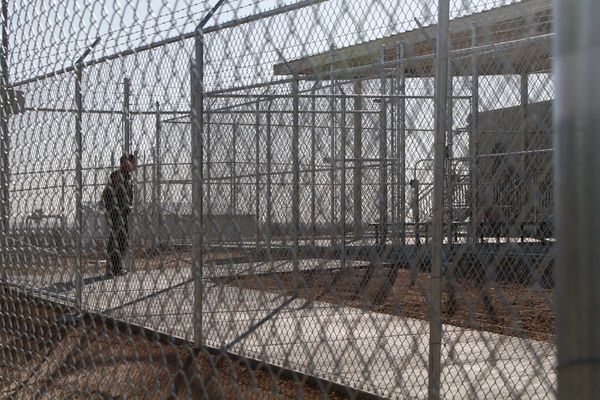
If people have doubts about the whole $368 billion AUKUS shebang, then its proponents — chiefly the defence department and the intelligence community — only have themselves to blame.
There is a particular arrogance that pervades the defence-security complex, one that says defence never needs to be held to account no matter how much money it splurges on hardware.
The public is expected to accept intelligence assessments at face value, even though this is the same intelligence community that produced the dodgy assessment justifying the US-led invasion of Iraq, with the UK and Australia as partners.
The defence industry, including former politicians and defence officials, has been salivating at the prospect of unlimited money from government coffers.
This week that was out in the open. Kathy J Warden, head of global defence corporation Northrop Grumman, hailed the multibillion-dollar opportunities that AUKUS held for investment between the US defence industrial base and Australia, as Australia became a “core partner” in America’s “deterrence” strategy against China.
“We are a leader in strategic deterrence … so we will be involved in pillar one of AUKUS,” Warden told The Australian during a visit to Australia where she met Defence Minister Richard Marles and other Albanese government ministers.
The financial side of the AUKUS agreement has been hailed in the UK for other reasons.
“The AUKUS deal is unusual in being a British defence project with virtually no downside,” wrote Professor Michael Clarke, former director of the Royal United Services Institute, in a letter to London’s The Times.
“It sustains and develops Britain’s successful submarine industries, creates the potent sort of partnership that Brexit was meant to stimulate, and best of all Australia is paying for most of it.”
Also writing in The Times, retired rear admiral Philip Mathias, a former UK director of nuclear policy, doubted the UK had “the capacity or effective leadership” to provide “the huge level of support” Australia would need to build its own nuclear submarine fleet.
“The performance of the Submarine Delivery Agency has been abysmal. Astute-class submarines are being delivered late by BAE Systems,” he wrote.
Yet supporters of AUKUS insist “the naysayers” — as styled by Peter Jennings, the former head of the Australian Strategic Policy Institute (ASPI) — are either misinformed about submarines and/or are stuck in the past when it comes to the China threat.
Jennings has been an influential voice in the framing of the China defence debate for several years. In the pages of The Australian, he has set out how and why AUKUS opponents need to be countered. He has warned that Australia’s commitment to AUKUS risks being undermined by the likes of Paul Keating, Bob Carr and others within the ALP ranks.
Jennings has set out a 12-point plan, which includes reconfiguring politics.
“Parliament needs to change,” he writes. “A special House of Representatives and Senate joint AUKUS implementation committee should be created. A key task is to turn some MPs into defence specialists, working with their US and British counterparts. This committee should still grill defence and the proposed submarine construction entity in a tough way, but it needs to be better informed than current parliamentary committees and understand its purpose is to deliver the best subs, not just aim for ‘gotcha’ media moments from hearings.”
Jennings has been criticised for being alarmist on China, but he is right to single out the Defence Department as needing to change.
“Defence [needs] to rethink its own approach to public engagement,” he says. “The Australian Defence Force hides behind a positive but dated image, tied more closely to World War I than future conflict. Defence needs to redefine its modern image. To do that it has to explain its business to the Australian public, not hide behind ministers and stay tight-lipped in parliamentary hearings.”
So how to restore trust when it comes to defence and security issues?
Here is a four-point plan for what needs to happen:
1) Defence needs to understand that it is not immune from accountability. Media contacts for the Defence Department should answer genuine public interest media inquiries instead of hiding behind an email wall.
2) There should be a permanent ban on former defence ministers taking corporate positions in the defence industry.
3) There should be a public register of former defence officials who go on to work in the defence industry. The register should spell out the conditions and the salary of their roles.
4) Defence media management needs to shift from giving drops to favoured journalists to engaging in frank public debate.
Please contact David Hardaker via his secure email dhardaker@protonmail.com if you wish to pass on information for Crikey’s AUKUS investigation.







